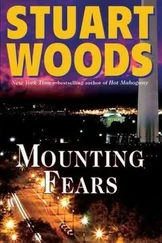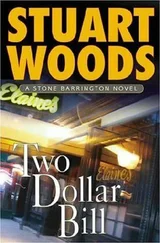He put the statement into his pocket, found his coat and went down to the parking lot, then he drove into town and parked in front of the bank.
“I’d like to see Kurt Ruger,” he told the secretary. Then he looked up to see Ruger waving him into his office.
“What can I do for you, Jesse?” Ruger asked, and his tone was cool. “You want to borrow some money?”
“Thanks, Kurt, but I’m here to do something for you.” He produced the balance sheet, unfolded it and handed it over.
Ruger read the document, then smiled, the first time Jesse had ever seen him do so. “Well, I’ll be damned,” he said. “The old goat is doing even better than we thought!”
“This year ought to be a lot better,” Jesse said. “I’ve developed two new plywood outlets in the East, and I think those will lead to more.”
“Yeah, Casey told me about the order from Maryland. That and the New York order, on top of the usual business, ought to keep the plant humming for the better part of the year.”
“That it will,” Jesse said.
“How’d you do it? How’d you get the computer password?”
“I just asked. I offered to help with the bookkeeping, and Herman jumped at it; said he hated doing it himself.”
Ruger stood up and offered his hand. “Jesse, I’ve underestimated you, and I’ve been suspicious of you over nothing. I want to apologize.”
Jesse shook the man’s hand. “Don’t mention it,” he said. “Is there anything else you want from Herman’s books?”
“If you could get me a temporary balance sheet for this year so far, that would help,” Ruger said.
“I can do that; I’ll drop it by tonight on the way home.”
Ruger smiled again. “We’ll own that business before the month is out,” he said.
Jesse left the bank and went back to his truck. Before the month is out, he mused, you’ll be in the joint. Or in hell.
At lunchtime on Tuesday, Jesse made what he was sure would be his last call to Kip Fuller.
“Kip, it’s Jesse. What’s happening?”
“Jess, we need another day.”
Jesse felt anger replace the dread. “Well, you can’t have it.”
“Listen to me, Jess; we’re going to do it the way you wanted; the army is sending in a battalion of Rangers, the best they’ve got. But they need a little more time to get things in place.”
“Well, they can’t have it. They’re just going to have to get their asses in gear and get it done very early on Thursday morning.” He looked at his watch. “That’s thirty-odd hours, and they’d better not be late.”
“Let me tell you the plan; it’s very close to what you suggested.”
“Okay, tell me.”
“The Rangers are being transported in a fleet of trucks — everything from a UPS van to eighteen-wheelers.”
“That’s good, I like that.”
“At one A.M. on Friday morning they’re going to simultaneously hit the police station and the telephone exchange. Ten minutes later, a specially reinforced truck carrying a heavy load of ballast is going to crash the gate at the top of the mountain; follow-up vehicles will discharge a company of Rangers, and at the same time, electric power will be cut to the whole town. This is very close to what you wanted.”
“It is, and it sounds right.”
“The Rangers will then take the weapons emplacements outside the main fortification, and when they’ve secured the ground-to-air missiles, the choppers will come in and put another two companies on the mountaintop.
“Right behind the troops at the main gate will be three heavy-duty swat teams of specially trained U.S. marshals; they’ll hit the homes of Coldwater, Casey and Ruger at the very moment that the truck crashes the gates.
“Headquarters will be in another specially equipped eighteen-wheeler; when they get word that the big three are in custody and that the Rangers are on the mountaintop, they’ll send in four C-130 aircraft, each of which will hold an armored personnel carrier and a complement of troops. Your airport at St. Clair has a forty-five hundred foot strip, and there’s a thousand-foot grass overrun, winter-hard, at one end of the runway. That’s enough for the C-130s. At the same time, other troops will arrive in unmarked cars and begin a door-to-door sweep of the whole town. We’ve arranged the biggest federal search warrant in history; it’s good for the whole county. We reckon that by dawn the town will be ours, and we’re counting on minimum casualties.”
“Kip, I think your plan is good. But it has to happen Thursday morning.”
“Jess—”
“Kip, shut up and listen to me. Tell them to hit at three A.M., not one. These people are likely to still be awake at one. I’ve got a shot at keeping Coldwater and his people out of the fortifications; if it hasn’t happened by three A.M. it won’t happen, and they’ll have to take their chances on a security leak that could give Coldwater some warning. You better pray I make it.”
“I don’t understand — what’s the big deal about another day?”
“The deal is, I can’t last another twenty-four hours. I’ve hardly slept at all since Sunday, and I’m starting to come unglued.”
“Come on, Jess, you’re tougher than that.”
“Kip, I don’t have anything left, and that’s the truth. I’ve planned for tomorrow night, and tomorrow night it is. Can this phone reach you at that time?”
“Yes, I can use call-forwarding to route your call to the headquarters truck.”
“Is there any way for you to find my position by backtracking the telephone?”
“No, we can only tell what cellular service area you’re in, and all of the area in the Idaho panhandle is in the same service area. We’ll have to depend on position reports from you.”
“I understand. Remember, now, hit the police and telephone buildings at three A.M., and not a minute before. I’m going to have a shot at paving the way for you, but I can’t promise anything, so don’t expect it.” He hung up before Kip could reply.
He hadn’t lied about his condition; he was a wreck, and he was going to have to get some sleep tonight, or he’d never make it.
Wednesday. Jesse suffered through the day, stopping work now and then to do his yoga breathing exercises, the only thing that seemed to help him relax. At the end of the day, he pretended to still be working while he waited impatiently for everyone to leave. When he was finally alone in the plant he went downstairs to the machine shop, found a canvas tool bag and started to select equipment. He wasn’t sure what he’d need, but he chose a six-pound sledge, a couple of cold chisels, wire cutters, pliers, some screwdrivers, a thick roll of duct tape and a pair of short bolt cutters. Finally, he unplugged a heavy-duty, half-inch, battery-operated drill from its charger and dropped that into the bag, along with a spare battery. The bag wouldn’t hold any more, so what he had would have to be enough.
He drove home, forcing himself to obey the speed limit, and parked the truck in the garage, then he dug out his bag of equipment from Kip and tucked it behind the seat of the truck, along with the tool bag. He crawled under the truck, opened the safe and extracted the contents. He put the pistol and spare clips into the canvas backpack and took the money, the passports and the miniature tape recorder into the house. Jenny was feeding the girls an early supper, as planned.
“Hey, everybody,” he said, trying to sound jovial. He sat at the table and drank a glass of milk while they finished their dinner, and, when the girls had been tucked into bed, protesting, he took Jenny back downstairs to the kitchen.
“All right,” he said, “time for final plans.” He went to the sink, took a plastic tool box from underneath it and emptied out the tools, then he removed the money from its brown paper bag and packed it into the tool box. “That’s a little over fifty thousand dollars,” he said. “Pack some sandwiches around it.”
Читать дальше












